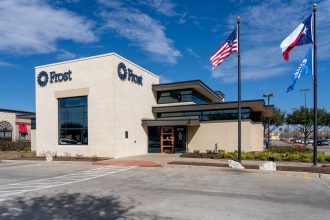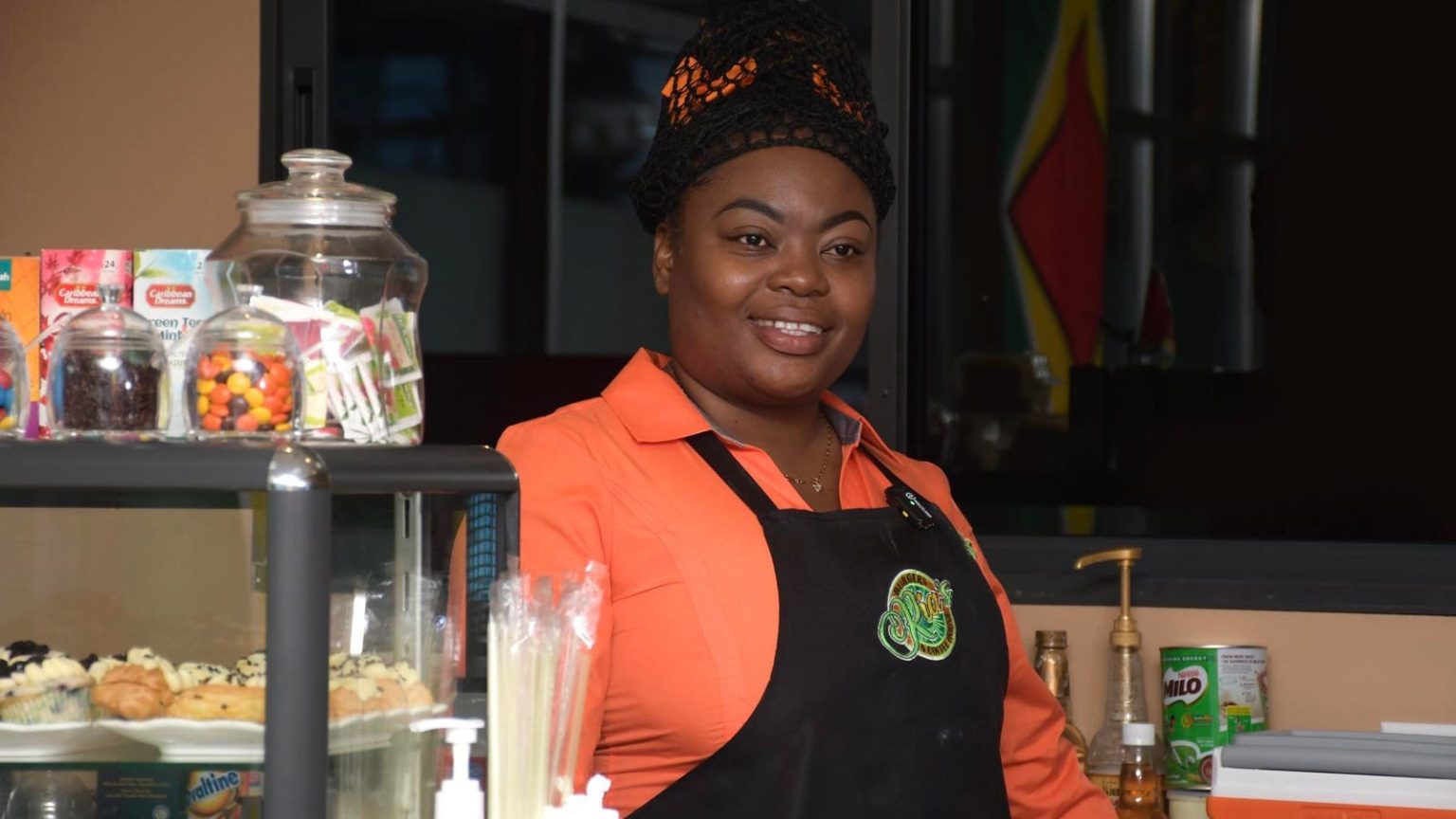“I cooked my first meal when I was only eight years old.” Sheeanta Lambert smiles, multi-tasking as she prepares a green smoothie and an ice latte behind the counter of Ria’s Burgers and Coffee House in New Amsterdam Guyana.
“My mother left to go to the market, and I used a chair to reach our kerosene stove and made balanjay [eggplant] all by myself.”
Laughing as she shares the childhood memory, the self-trained chef and proprietress of the newly opened eatery, admits she’s come a long way from her life as the middle child, eagerly cooking for her family of seven.
Not too long ago, during the pandemic, the mother of two began producing raw juices from her kitchen to help support her family. Her tangy, ginger infused creations became a crowd pleaser at a time when neighbors and friends were desperate to boost their immunity. Word spread that the home-based caterer was selling healthy and delicious beverages.
It was not too long before her daughter, Ria and others began to encourage her to take her craft to the next level, but for Sheeanta, converting her ‘side hustle’ into a formal food service business was intimidating and out of her comfort zone.
Sheeanta’s story was similar to that of many women in Guyana’s agri-food sector.
While making significant contributions to food systems, women’s roles are frequently part time or irregular and in low-skilled positions in the least lucrative parts of the value chain. Structural barriers associated with obtaining credit, land ownership, production assets, regulatory rights, and equal pay prevent many from taking formal positions or becoming entrepreneurs.
“I was afraid to take that next step,” Sheeanta admits.
Had it not been for a women’s empowerment programme that she completed through her country’s Ministry of Human Services and Social Security, she might not have taken her lifelong dream to fruition.
“Women’s empowerment builds resilience and is critical to food security,” says Dr. Vindhya Persaud, Guyana’s Minister of Human Services and Social Security (MHSSS). “When women advance, they are more likely to reinvest their income back into their household to support their family’s nutrition, health, and education. This has a multiplier effect throughout their communities.”
Women’s Innovation and Investment Network (WIIN) training Programme, the brainchild of Dr. Persaud and her ministry, is one of a number of initiatives being offered to Guyanese women across the 10 Administrative Regions of Guyana through the Guyana Women’s Leadership Institute (GWLI). To date, it has trained and empowered thousands of women, providing them with the skills and confidence to pursue economic opportunities and become financially independent across numerous in-demand professions— including the agri-food sector.
“One of the features of WIIN is that we not only provide training and certification, but there’s a second element of micro enterprise development to ensure that women get into small businesses. After women finish the training, they join the WIIN Business Clinics and develop their own business plan,” explains Sanjay Pooran, Coordinator of GWLI and the WIIN programme.
“Women make up over half of the population [of Guyana],” says Pooran. “If we really want to capitalize on economic opportunities that come out of the oil and gas sector, we need to ensure that more of our women are involved in employment opportunities and micro enterprise.”
Another objective of the program has been to ensure that resources, such as startup capital, are accessible to graduates.
The World Food Programme’s commitment to working with regional governments, building resilience, and protecting the livelihoods of the most vulnerable made the UN organization an ideal partner for the government of Guyana.
“Providing women with the tools for empowerment isn’t just a moral imperative; it’s the catalyst for sustainable progress,” says Regis Chapman, Representative and Country Director of the WFP’s Caribbean Multi-Country Office.
“When we invest in the strength and potential of women, we illuminate a path towards a brighter future. Independence breeds resilience, education ignites progress, and compassion fuels the transformation of entire communities.”
Through a partnership with WFP (funded by the Government of Canada and the Joint SDG Fund) a cash grant was provided to WIIN graduates to invest in resources and opportunities while helping to shield them from the impact of COVID-19 and global food price increases.
“I did the program because I wanted to better myself. Learning with a whole bunch of women— I think it was almost like 90 of us. Women inspiring women,” Lambert recalls. “When I received the money, I used it to buy equipment which was a huge boost for my business.”
Attracting tens of thousands of applicants over the past three years, the WIIN program has been wildly successful and, while not directly targeted at alleviating food insecurity, this has been one of the many positive spillover effects.
“I grew up in a community called Stanleytown,” says Lambert of her upbringing. “We had a few nurses, teachers… Back then, women were not entrepreneurs, women were not working. I would say 80% of the women were at home taking care of their children.”
Removing structural barriers to small business success for women has created added opportunities for female entrepreneurs in the food sector and has the potential to expand and improve the efficiency of local food markets.
Research shows that empowered women are better able to improve nutrition in their families and communities and play a significant role in reducing hunger at a national level.
“I’ve never stopped seeing the link between the social issues that women have to deal with and behind that, the financial inadequacies that might exist that prevent them from surmounting those challenges,” says Minister Persaud. “In this light, the WIIN program and the partnership with the World Food Program is very practical.
Disposable income will allow women to be able to provide for their families. Sometimes it’s as simple as putting a meal on the table. And for those women who come from rural communities, and hinterland communities, where agriculture plays a very important role in determining where they want to go in business… That is the big picture of this government… we are heavily investing in agriculture, heavily investing in women in agriculture, heavily investing in things like shade houses, and hydroponics.”
Latesha Cadogan, a beneficiary from Linden, for example, is using the skills that she learned in the WIIN program to get into mushroom production, with the objective of supplying a variety of strains of mushrooms to a growing demographic of foreign oil workers.
And for participants such as Radhika Basdeo— Founder and CEO of agri-food company, Basdeo’s Dynasty— the WIIN program has provided a source of inspiration to her young daughters and an entire community of women.
Basdeo, a manufacturer and packager of condiments, spices, salted fish, plantain flour, split pea powder and other food items is a strong believer in the value of women’s empowerment.
“WIIN opens up that room for women to be leaders, to break out of stereotypes, to be independent, to be better people,” says the female agri-processor. “I mean, you can have no educational background and the WIIN program will give you that fair chance to earn a qualification with a recognizable certificate.”
After taking part in WIIN, Basdeo would scale her small business selling produce to a full-on accredited production facility and retailer.
“I was a single mom when I started. Basdeo is my family name and I wanted to give something to my family. When I looked up the meaning of dynasty, it said something about members of one family coming together to form a business. That’s how it became Basdeo’s Dynasty,” she says, stirring a bubbling pot of hot sauce.
And true to its name, the entire family has participated in the growth of the small business. Basdeo’s mother, an owner of a stall at a local market, her father, a supermarket manager, her cousins, her new husband and two daughters all play a role in the growing business.
“My daughter gets so excited to apply the GNBS [Guyana National Bureau of Standards] sticker to our goods,” Basdeo beams at her daughter’s pride in the certified processing facility.
Basdeo’s business not only adds to Guyana’s food systems landscape through the introduction of value-added products but it has also contributed to the preservation of local culinary heritage through the GNBS Made in Guyana Certification Mark Programme.
Basdeo’s mango achar, a spicy, tangy pickled South Asian condiment enjoyed across Guyana, is made using a “modernized” recipe passed down from her paternal grandmother and is one of her best sellers.
The achar, and her other locally inspired products, quickly sold out at Barbados’ agri-food trade expo, Agro-fest, that she attended upon invitation from the Guyana Marketing Corporation upon completion of WIIN.
The additional grant that Basdeo received with the support that WFP provided to the WIIN programme enabled her to make a large investment in raw materials to build up her inventory for the overseas event.
“You know, as an agri-processor getting out there on your own, nobody wants to sell to you,” she says of her early difficulties sourcing raw materials. “Nobody even wants to sell you a hundred pounds of pepper, or two tons of mango, or a hundred pounds of salted fish.”
She remembers the early days of her business, having to leave home at 3am to meet fishers at the wharf, and her eyes fill with tears as she recalls missed moments with her daughters and school events she couldn’t attend.
“I’m doing this for them,” she says with resolve. “I’m putting our name out there so that they can continue the dynasty when I’m no longer here. And as hard as it’s been, I keep moving forward. I’m like, you know what, it’s not gonna be like this forever. Things are gonna change. Things are gonna improve. I need to keep going.”
Basdeo is determined to inspire her children, to motivate other women and to continue empowering herself through the expansion of her skill set so that she can open more businesses.
“I’m still focused on Basdeo’s Dynasty, but it’s not limited there. I can do more. I can push more. I can hire people to do it for me,” she says.
Sanjay Pooran agrees with her approach.
“It’s not just about empowering women,” he says. “It’s ensuring that they have participation in the economic growth of the country. And by doing all those things, we’re creating the environment for true and genuine equality. Minister Persaud has made it clear that is part of our vision. It’s one thing to have women in leadership— it’s another thing to have women as part of the economy.”
One of the many lessons emerging from the WIIN program is that women are key to solving hunger, not just within their own homes and communities, but at a national and regional level.
Minister Persaud envisions the addition of a state-of-the-art kitchen to the WIIN program, which she hopes will drive a farm to table movement of food production— an innovative new industry driven by local foods. The WIIN team is also working on growing an online marketplace that will serve as a platform for the new women-owned businesses.
“The entire concept was focused on making women win, win for themselves, win for their families, and win for their future,” says Minister Persaud.
As one of only two net food exporting countries in the region and, having taken on a leadership role in improving the food security of the Caribbean Community (CARICOM), Guyana’s agri-food sector is critical to the local and regional economy. Local production, promotion of entrepreneurship in agri-food value chains and the development of networks are all critical to this end.
The government of Guyana has identified a tremendous opportunity to help Guyanese women gain access to resources, knowledge, assets and income in a more formalized way, to improve their food security and grow their independence— and in so doing, contribute to the growth of Guyana.
Read the full article here





